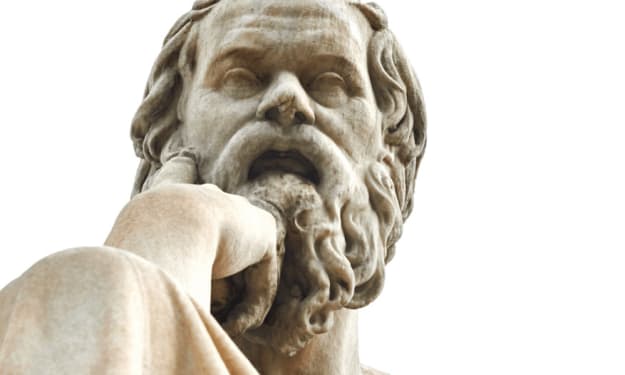
“There is only a perspectival seeing, only a perspectival ‘knowing’; the more affects we are able to put into words about a thing, the more eyes, various eyes we are able to use for the same thing, the more complete will be our ‘concept’ of the thing, our ‘objectivity’.” - Nietzsche
The first time I came across the above quote by Nietzsche, I thought, “Yes, that is totally accurate!” I was in college and I hadn’t always thought that way.
When we are young, things seem relatively clear—we are still learning how the world works and what it is comprised of. There are authority figures in our lives and things, for the most part, are presented with certainty. There are right things and wrong things, there are facts and there are lies; in short, there is the way things are and then there is make-believe, pretend, pretense.
In the early stages of our education, the focus is on learning facts, information, and the basic tools needed to think. We learn, for example, how to identify things in the world, how to construct a sentence, the favored historical narrative, and how science explains natural phenomena.
Our education at the early stage is focused predominately on the regurgitation of information. We are given information and tested on the extent to which we can recall it. Perhaps this gives us a foundation for later…At any rate, it is the method we still favor.
What is important is that for most of our lives we don’t really question the information provided, we don’t question whether it’s accurate. The teacher knows, your parents know, so and so knows…we trust these individuals to provide us with accurate, truthful accounts.

When I began my journey into the study of philosophy, I was struck by the diverse and varied accounts, by the different arguments, and by the kinds of difficult questions philosophers ask.
Philosophers, I learned quickly, do not agree. They use argumentation as a tool in their pursuit of truth, knowledge, and wisdom. I found that philosophy was full of different perspectives on truth, full of different perspectives regarding how the world works and how values apply.
When Nietzsche claimed that there “is only a perspectival seeing, only a perspectival ‘knowing,’” he was pointing out that the way we see the world, the way we interpret things, our knowledge, depends upon our values and tacit beliefs. What we know, our experience, is shaped by our perspective, our standpoint.
Nietzsche realized that knowledge requires a perspective or point of view. You cannot have truth without first choosing a standpoint.
This is most evident when considering evaluative concepts. When we say things like “Beauty is in the eye of the beholder” or when we recognize a distinction between the morality of one culture and the morality of another, we are affirming the perspectival nature of truth, of seeing things a certain way from a specific standpoint or point of view.
For Nietzsche, there is no objective truth to be discovered, but only what is true given a certain perspective or way of looking at things. When we realize this, we become more aware of the role of tacit beliefs, biases, convictions, and values in shaping the world we come to accept as given. It makes us more accepting of different narratives, different perspectives, because we have an easier time recognizing that no one perspective has it perfectly right.
“the more eyes, various eyes we are able to use for the same thing, the more complete will be our ‘concept’ of the thing, our ‘objectivity’.” - Nietzsche
In Plato’s dialogue, Euthyphro, Socrates makes the point that the gods only argue when it comes to evaluative notions like beauty, justice, or the good.
Socrates’ point is that we do not need to argue about whether a room is ten feet long or whether an object does or does not weigh fifty pounds. No, we can simply measure the room or weigh the object—problem solved. We do argue, however, about what is right, about beauty, about whether things are fair or just, because we lack a clear way to define and thus determine what counts as an example of the right, the beautiful, the just.
The way we explain the world, the way we see, is greatly influenced by our values and background beliefs—our perspective.
When Nietzsche says, “the more eyes, various eyes we are able to use for the same thing, the more complete will be our ‘concept’ of the thing, our ‘objectivity’,” he’s suggesting that when it comes to humankind, the more perspectives we understand, the more ways in which we are able to see something, the more we will understand what that thing is and its role in human life, in the human world.
What I’ve learned from philosophy, then, is that we need to be more open to other people’s perspectives. We need to have an interest in learning, in seeing things differently, and in recognizing that our standpoint is not the only standpoint.
In short, we need to recognize that we do not have a special vantage point on truth. Our perspective, our narrative, is often just as flawed as the next person’s.
Thanks for reading!
If you enjoyed this piece, please like it and share it.
About the Creator
Dan Garro
Philosopher/Educator/Writer/Podcast Host & Producer
I'm a philosophy professor, avid reader, I love writing, and I co-host/produce The Existential Stoic Podcast.
Enjoyed the story? Support the Creator.
Subscribe for free to receive all their stories in your feed. You could also pledge your support or give them a one-off tip, letting them know you appreciate their work.






Comments
There are no comments for this story
Be the first to respond and start the conversation.